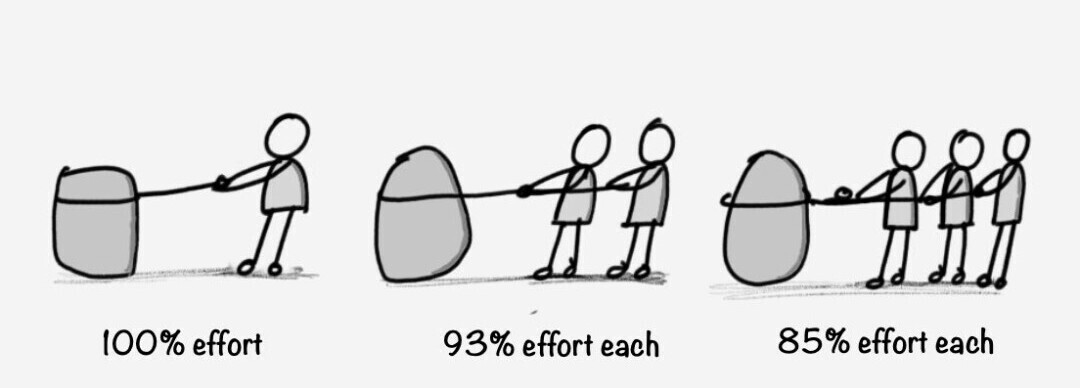Introduction
In the realm of decision-making, our ability to evaluate options and make rational choices is paramount. However, human psychology often introduces biases that can cloud our judgment and lead us astray. One such cognitive bias is the Ringelmann Effect, a phenomenon that reveals the counterintuitive outcome of decreased individual effort within a group setting. Understanding this mental model is crucial, as it sheds light on the pitfalls of group decision-making and highlights the importance of individual responsibility within a collective context.
Defining the Ringelmann Effect
The Ringelmann Effect, also known as social loafing, refers to the tendency of individuals to exert less effort when working as part of a group compared to when they work alone. In simpler terms, it is the notion that the whole is sometimes less than the sum of its parts. This effect was first identified by French agricultural engineer Max Ringelmann in the early 20th century when he observed that individual productivity decreased as group size increased.
Relevance in Decision-Making Processes
The Ringelmann Effect carries significant implications for decision-making processes, affecting both personal and professional spheres. When individuals come together to make choices collectively, there is an inherent assumption that the combined effort will yield better results. However, the Ringelmann Effect suggests otherwise. If left unaddressed, this bias can lead to irrational decisions that are contrary to the best interests of the group.
Anchored in Human Psychology
To understand the prevalence of the Ringelmann Effect in our day-to-day lives, it is essential to delve into the underlying psychology at play. Several factors contribute to this bias, including diffusion of responsibility, social comparison, and reduced motivation. Diffusion of responsibility occurs when individuals believe their efforts will be diluted within a group, leading to a decreased sense of personal accountability. Social comparison, on the other hand, arises from the tendency to compare oneself to others, resulting in reduced motivation when surrounded by less competent or motivated individuals.
Examples of the Ringelmann Effect
Personal Life Decisions: Consider a scenario where a group of friends plans a hiking trip. Each member assumes that others will bring necessary equipment, leading to a lack of individual preparation. As a result, critical items are forgotten, and the overall experience suffers.
Business Scenarios: In a corporate setting, a team is assigned a project with clearly defined roles and responsibilities. However, due to the Ringelmann Effect, some members assume that others will shoulder the burden, resulting in subpar work and missed deadlines.
Public Policy-Making: Government committees tasked with making crucial policy decisions may face the Ringelmann Effect. Individual members may contribute less effort, assuming others will carry the weight, leading to compromised policies that do not align with the public interest.
Mental Biases and Psychological Underpinnings
The Ringelmann Effect is intertwined with various cognitive biases that further exacerbate its impact. Social facilitation, a well-known psychological concept, suggests that individuals may perform better in simple or well-rehearsed tasks when observed by others. However, in complex or unfamiliar tasks, the presence of others can lead to reduced performance and the emergence of the Ringelmann Effect. Moreover, the conformity bias can also contribute to social loafing, as individuals may be influenced to match the perceived level of effort displayed by their peers.
Identifying and Avoiding the Ringelmann Effect
Recognize the Potential for Social Loafing: Awareness is the first step in overcoming the Ringelmann Effect. By acknowledging the bias and its potential impact, individuals can become more vigilant in detecting signs of reduced effort within a group setting.
Promote Individual Accountability: Encouraging individual responsibility is key to counteracting social loafing. Clearly define roles and expectations, ensuring that each person feels personally accountable for their contributions.
Foster a Positive Group Environment: Establishing a supportive and engaging atmosphere can help mitigate the Ringelmann Effect. Encourage open communication, collaboration, and regular feedback to maintain motivation and prevent the diffusion of responsibility.
Set Measurable Goals: Clearly defined and measurable goals provide a benchmark against which individual efforts can be evaluated. This helps counteract the tendency for individuals to “hide” within a group, ensuring that each person’s contribution is recognized and valued.
Conclusion
The Ringelmann Effect represents a compelling mental model that sheds light on the counterintuitive decrease in individual effort within a group setting. By understanding this bias and its underlying psychological factors, we can make more informed decisions and avoid the pitfalls of social loafing. Through personal accountability, fostering positive group dynamics, and setting clear goals, we can overcome the Ringelmann Effect and unlock the collective potential of group decision-making. Awareness and active avoidance of this mental trap can lead to more effective and rational choices, both in our personal lives and within larger societal contexts.
